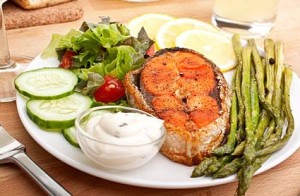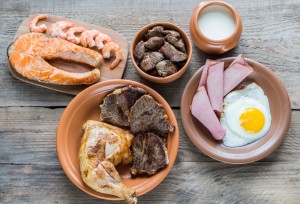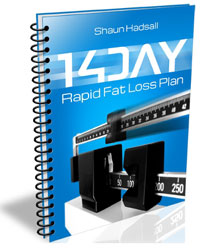A No Carb Diet Makes You Wonder… Can You Really Lose 100 Pounds Without Exercise, Or Become a Super Athlete? And Amazingly Enough, The Answer Is: YES!
On a no carb diet you’ll lose 100 pounds – with no exercise. NFL linemen can train harder and feel less pain with zero carb intake. Quit eating carbs and you’ll melt away to almost nothing!

The myths abound.
And other claims are even wilder, and harder to believe.
So what’s the deal with a no carb diet?
- Is it good – or bad?
- Should you try it – or not?
- What to eat – and when?
That’s what we’ll discuss here.
Understanding a No Carb Diet
A low carb diet is not the same as a no carb diet.
A zero carb diet is much more intense and excludes all carbohydrates.
So how does your body get energy then?
Fat becomes your main source, with protein for backup.
You’ll eat eggs, cheese, fish and meat.
A low carb diet makes you ketogenic.
Dietary fat is converted into ketone bodies. These are oxidized for energy.
Because this is NOT how your body normally works, you should talk with your physician before going on a no carb diet.
Although it’s called a no carb diet and restricts intake to less than 50 grams of carbohydrate daily, you’ll be surprised that even when you eat more carbohydrate, you’ll still continue to lose weight.
How To Go On a Zero Carb Diet?

It’s not easy to get started on a near-zero carb diet and stick with it. So give yourself some time to prepare.
Concentrate on the food you’re permitted to eat (No carb diets can be tasty and you won’t have to give up something).
Enjoy trying out new recipes and meal plans.
The first step is to determine how much carbohydrate you can eat and still lose fat.
Cutting down on carbs optimizes your body composition and improves biomarkers of health. However, many dieters don’t understand that carbohydrates are necessary for the body, especially if you are physically active or in training.
By eating enough carbs to keep liver stores of glycogen topped up and to fuel your brain with glucose, you’ll lose fat without any drop in energy level, mental function or mood changes.
Paleo diets and the Atkins diet are low / no carb diets which work well in sedentary populations, but not with active dieters.
Here’s What A No Carb Diet Does
If you run, ski, train with weights, go cycling or engage in any other high energy activity, a no carb diet won’t provide enough calories.
This may be counter-productive – so it’s important that you understand the principles behind a zero-carbohydrate diet plan.
Diets must be tailored to your specific circumstances, body type, health conditions, activity and goals.
Think about it like driving a car.
If your car is always locked up in the garage, it won’t matter
if you fill the tank with gas or not. But if you drive long distances every day, you must top up frequently, or you’ll run out of fuel.
Your body is just like that.
Loading up on carbs while you’re sedentary only floods the blood with extra glucose which is stored as fat, leading to diabetes, high cholesterol, insulin resistance and other problems.
But if you starve yourself of carbs while you are active, you’ll experience fatigue, irritation, depression, muscle and bone loss, suboptimal performance, insomnia, lower sex drive and a slower metabolic rate.
So, Is a No Carb Diet Unhealthy?

Nutritionists typically recommend that
- 50% to 65% of your daily calories come from carbohydrates,
- 20% to 30% from fats and
- the rest from protein.
A no carb diet, on the other hand, is different. In this rigorous diet plan,
- 70% of energy requirement comes from fat,
- 30% from protein, and
- almost none from carbs.
Since body fat has to be converted into ketones before use as fuel after glycogen depletion, this is also called a ketogenic diet, or simply “keto”.
Bodybuilders adopt a reduced carbohydrate diet before contests to retain muscle mass while shedding water and fat by forcing their body to burn fat for energy.
A no carb diet is therefore not unhealthy.
However, it produces some unusual metabolic changes in your body which now adapts to a low carb intake by finding alternate sources of energy such as converting fat and protein to glucose which is stored as glycogen.
Your brain switches over to using this alternate source of fuel when daily carb intake drops to less than 50 grams.
Who Needs No Carb Diets?
Originally recommended for people with morbid obesity or epilepsy, a no carb diet is now gaining popularity among other dieters after a lot of research was done on balanced carb diets.
As the linesman of New York Giants Geoff Shwartz says of a zero carb diet, “You’ll feel leaner, more energetic and recover faster from workouts. You’ll just feel better in general.”
The message to athletes is clear.
On a zero carb diet, you’ll train harder and for longer – and hurt less.
Two benefits of a no carb diet highlighted by nutrition specialist Dr.Steve Phinney are that
- fat loss is replaced with lean muscle, and
- anti-inflammatory mechanisms are activated leading to less soreness after training.
Phinney says:
“On a no carb diet, your body gets efficient at burning fat for energy, both during exercise and at rest.”
Six days without carbs and a lot of protein is enough for this effect to kick in.
Small amounts of nutritious sources of carbs like fruits and veggies are alright.
No Consensus on Low / No Carb Diets
UCSF dietician Katie Ferraro doesn’t agree.
She thinks a no carb diet is inefficient at processing fat and protein for energy, and advocates caution in embracing a carbohydrate-free eating plan.
“It’s like trying to run a car on empty!” says the articulate assistant professor.
In fact, Dr.Ferraro likens a low carb diet to filling your luxury car’s unleaded petrol tank… with diesel!
And then expecting peak performance from it.
She says:
“That’s not a good way to eat over a long time.”
A no carb diet requires you to eat natural (unprocessed) foods that are low in carbohydrate content.
- Eat egg whites and cheese for breakfast.
- Chicken and veggies for lunch.
- Hamburger patties, cheese and more vegetable for dinner.
- Supplemented with low-carb protein shakes.
Schwartz, a nutrition expert, says that it’s tough to ensure that 70% or more of your calories come from fat.
Eating that much fatty food is hard, even if you add plenty of coconut and olive oil, avocado and more to your recipes.

What Do You Eat on Zero Carb Diets?
How to lose weight fast?
It depends on your health status, your activity level and your weight.
Pick smaller quantities of processed food items to fit your budget. Your diet will ideally include plenty of protein and fat, with very few carbs.
The base could be pork and eggs or other meats and fish like tuna and salmon.
Fish oil or flax seed oil can make up the rest of your calorie requirements.
You can eat meat, eggs, fish, vegetables, fruits, nuts, seeds, reduced-fat cheese, yoghurt, sour cream and healthy oil.
You should avoid sugar, trans fat, wheat and highly processed foods.
If weight loss isn’t your main goal, you can eat more carbohydrate like sweet potato, rice, oats, quinoa and legumes and drink coffee, tea or soda without sweeteners.
Zero carb foods – in a picture
Click for larger image
A no carb diet can appear severely restrictive in terms of your eating choices – especially if you use a weight loss calculator to keep track of your calorie intake.
On a carb free diet, you might have to rely only on plant oils, spices and salt for flavouring. All carb-containing foods are off the menu.
Such stringent eating habits aren’t easy to sustain, not to mention that they come with some unpleasant features as well.
Side Effects of No Carb Diets
The longer you stay on a zero carbohydrate diet, the more stress it places on your kidneys and liver.
Headache, nausea, tiredness and bad breath are common side effects of a ketogenic diet. Prolonged low carb intakes might even reduce libido.
All these are reasons why a no carb diet is intended only for short term weight loss, and not meant to be a long term plan (like a Dukan diet).
Also, in a practical sense, a no carb diet becomes restrictive in food choices.
After a while, a meal of mushrooms, spinach and asparagus begins to look unappealing, even if you are shedding extra pounds of fat.
All of this leads to a higher rate of abandonment with a low carbohydrate diet than other alternatives that are not too restrictive and strict about what you can eat.
A more balanced approach to fat loss than a no carb diet will have a wider following.
One of the best weight loss diet choices is Shaun Hadsall‘s’14 Day Rapid Fat Loss’ program.
This program emphasizes healthy eating, regular exercise workouts, and other healthy practices.

FAQ – No Carb Diet
All your concerns regarding the no carb diet is addressed here
What is no carb diet?
The no carb diet or zero carb diet is an extreme diet featuring no carbohydrates. All digestible carbs are removed from your daily diet.
So, whole grains, fruits and vegetables containing carbohydrates are out. So are legumes and beans as there carb content is considered high. Only foods with no digestible carbohydrates are allowed on this diet which can be considered an extreme version of the other more popular low-carb diet.
Is no carb diet helpful in losing weight?
While eliminating carbs completely helps shed pounds and may even have some health benefits the more important question that needs to be addressed here is that is it really necessary to go such extreme diet to lose weight.
It is a highly restrictive diet which eliminates most foods. It may not be really necessary to go to such extremes for very simple goal. You can lose weight even without the highly restrictive no carb diet.
What does no carb diet mean to you in day to day life?
Carbs are our primary source of food. They fuel our bodies as they are easily converted to glycogen. They are found in cereals, beans, legumes, fruits, vegetables, in dairy, bread, pasta, in cakes and desserts.
If you decide to go on a no carbohydrate diet you will have to avoid almost everything and survive on protein and fat alone.
Though some people do consume non-starchy vegetables, nuts and seeds, high fat fruits like avocado are allowed as the carbs in them is minuscule as part of their no carb diet. The problem with extreme diets like no carb diet is that is very difficult to follow them day-to-day.
What is allowed in no carb diet?
In a no carb diet the main sources of diet are proteins and fats. Proteins come from meats, fish, eggs, cheese and fats from oils and butter. Those who are not on a very strict no carbohydrate diet sometimes eat vegetables with very little starch like cauliflower and broccoli.
They have more fiber and less of the digestible starch. So, it is considered as no carb. Under the no carbohydrate diet high-fat fruits like coconut and avocado are also allowed.
Though it is very similar to ketogenic diet, the no carb diet is in fact very restrictive if you follow it without exception.
Some sources ask you to restrict your carb intake to less than 30 gm per day. But a extensive research did not come up with any set protocols on what and how much to eat in this diet.
Does it help you lose weight?
Since, you are not taking any carbohydrates, it should help you lose weight if you remain within your calorie limits.
When you replace carbs with proteins and fats you feel full when you eat fewer overall calories. You also feel satiated and don’t crave for desserts. These factors promote weight loss.
Another point noted was that no carb diets result in rapid weight loss in the initial few weeks as there is a drop in water weight in the body. One gm of carb holds on to 3 gm of water.
So the depletion of carbs results in depletion of water stored in the body.
Studies have shown that those on no carbohydrate diet lose 4 kg more weight than those on low fat diet. Studies have also shown that those on no or low carb diet showed more sustained weight loss over a year.
Other studies have shown there isn’t much of a difference in either a low carb diet or other low calorie diet programs.
A more balanced approach to fat loss than a no carb diet is better in the long-term for your health.
One of the best weight loss diet choices is Shaun Hadsall‘s’14 Day Rapid Fat Loss’ program.
This program emphasizes healthy eating, regular exercise workouts, and other healthy practices that will work for you in the long-term.
Does a no carb diet benefit the heart?
Very low or no carb diets lead to low blood triglyceride levels.
Elevated triglyceride levels are associated with high risk of heart attack. With no carb diets you can reduce the triglyceride levels by 40% over just 3-4 months.
The no carbohydrate diet might also help raise the good cholesterol levels – that is HDL in blood which protects the heart.
Overall your heart health may improve on a no carb diet.
Does it help control blood sugar?
Refined carbs and sugars are the main cause of high blood sugar. In a no carb diet this will be eliminated from the diet and hence can aid in blood sugar control. Those with diabetes might find a no carb diet useful to get their blood sugar under control.
Again it is not necessary to follow such a restrictive diet as even on a higher carb diet the sugar levels can be controlled. But this might be helpful for folks who are unable to control blood sugar through their low calorie diet.
Does it lower blood pressure?
No carb diet might help with decreasing blood pressure, though more studies are needed to say so conclusively.
Does no carb diet help reduce belly fat?
Some research seem to suggest that no carb diets are better at lowering belly fat than low fat diet.
Does a no carb diet cause constipation?
Yes, there is a real risk of constipation on a no carb diet. With most fruits and vegetables eliminated from the diet, there is hardly any fiber to help in digestion or removal of toxins.
Fiber helps in bowel regularity too. So, a highly restrictive no carbohydrate diet can lead to serious issues of constipation and digestive discomfort.
Constipation can lead to other problems like fissures. Chia seeds and flax seeds can help with fiber. Cauliflowers and other non-starchy fibers-rich food should also be included in diet to regulate bowel movements.
Does a no carb diet cause low energy levels?
Carbs are body’s main source of energy. When consumed they quickly get transformed into energy which is used by body to help power it.
By eliminating all carbs you will be forcing the body to adapt to other energy sources like fat and proteins. The whole way body breaks down food to convert to energy is changed in the no carbohydrate diet.
Before the transition from carbs to proteins and fat the body might experience a period of low energy and general fatigue. During the transition phase people experience nausea, sleep disturbances and poor mental functions. This is normal. Once you reach the ketosis stage you will experience a return to normal.
Does no carb diet lead to nutritional deficiencies?
By restricting our diets to only proteins and fats we are denying the body ready access to vitamins and minerals which are readily available from fruits, vegetables and grains.
This causes deficiencies in micro-nutrients.
Also, a zero carbohydrate diet causes more urination which means you will be losing potassium too over time.
A balanced diet is not possible with a no carb diet. So over time you might end up with many nutritional deficiencies which need to be fixed through careful supplementation and evaluation.
Instead of a no carb diet try one of the best weight loss diets.
Developed by Shaun Hadsall‘s ’14 Day Rapid Fat Loss’ is one of the most balanced programs.
Is a no carb diet possible in the long term?
You might be able to follow a zero carbohydrate diet for short term like 3-6 months. But longer than that it becomes difficult due to the some of the problems highlighted above.
There is also not much data on the long-term effects of such a restrictive diet. So, don’t do it for the long term. It is high in fat, highly restrictive and not well researched as yet.
Try the Shaun Hadsall‘s ’14 Day Rapid Fat Loss’ program instead.
Children, pregnant women, mothers breastfeeding their babies and those with any health conditions like cholesterol hyper responders should not be following this diet.
What foods are allowed in a no carb diet?
Here’s by no means an exhaustive list of foods allowed under the zero carbohydrate diet. Check them out:
Meat: Chicken, turkey, beef, lamb, bison, venison, pork – all kinds of meat is allowed and eggs too.
Seafood: Fish like salmon, tilapia and cod. Crab, Shrimp, sardines and herring.
Fats: butter, lard, cheese, oils
Nuts and seeds with no or low digestible carbs: almonds, walnuts, pumpkin seeds, sunflower seeds, pistachios, cashews
Drinks allowed: water, black coffee, green tea and black tea – no sugar or no milk allowed
Vegetables low in net carbs: cauliflower, broccoli, zucchini, bell peppers, leafy greens, turnips, Brussels sprouts, asparagus, mushrooms
High-fat fruits: coconut, avocado
Seasonings: herbs and spices
What foods to avoid on a no carb diet?
The following food cannot be part of your zero carbohydrate diet.
- All grains and cereals including rice, wheat, quinoa, barley.
- Baked goods and sweets like bread, pizza, pasta, cake, cookie
- Sugary and sweet drinks, fizzy drinks, fruits juices.
- Avoid fruits and vegetables like apples, oranges, bananas, potatoes, peas, squash, berries and more.
- Legumes and beans – Avoid all kinds of beans like black, red, kidney, lentils, chickpeas.
- Avoid all dairy except cheese and butter.
- Don’t drink alcohol including brandy, beer, whisky, wine or vodka. These are not part of the zero carbohydrate diet.
Don’t add ketchup, sauces and salad dressings and other condiments bought at the store to your meals . You can make your own dressings consisting of fats and seasonings and try to aware of any carbs you might include by accident in your no carb diet.
One of the best weight loss diet choices is Shaun Hadsall‘s ’14 Day Rapid Fat Loss’ program.
This program emphasizes healthy eating, regular exercise workouts, and other healthy practices.
